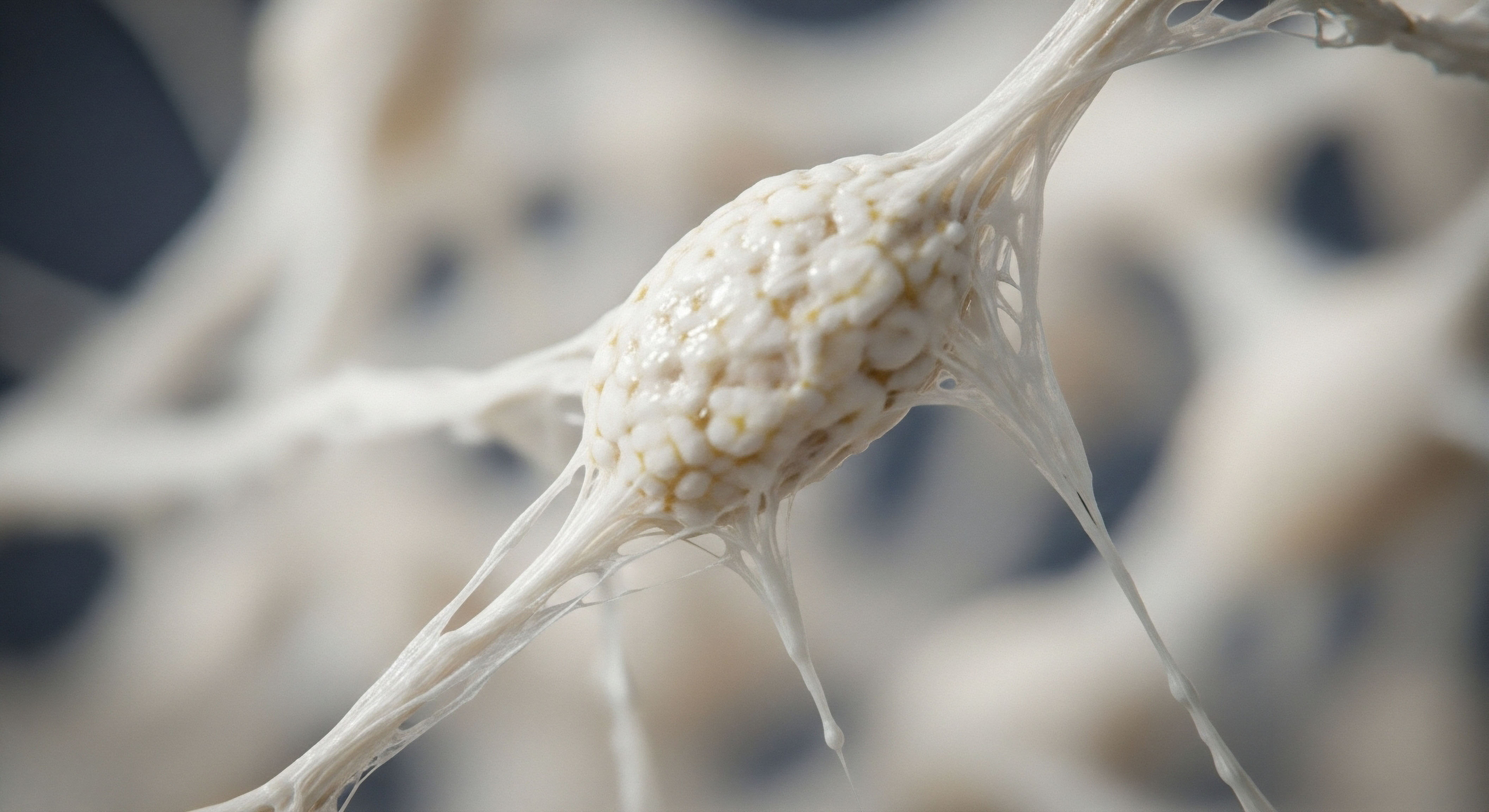

The Cellular Symphony of Peak Existence
Your cells are the fundamental architects of your vitality, the intricate powerhouses driving every facet of your existence. They are not merely passive components; they are dynamic, responsive units, orchestrating the complex symphony that defines your performance, your resilience, and your very longevity. Understanding this profound truth is the first step in mastering your biological destiny.

The Microscopic Engines of Macro Performance
At the heart of every cell lies the mitochondrion, the veritable engine room where energy is forged. This organelle is responsible for cellular respiration, the process that converts nutrients into adenosine triphosphate (ATP), the universal energy currency of life. Optimal mitochondrial function directly translates to sustained energy levels, enhanced cognitive clarity, and superior physical output. When these microscopic engines hum with efficiency, your capacity for high performance across all domains of life expands exponentially.

Fueling the Biological Machine
The efficiency of ATP production is a direct determinant of your daily experience. Insufficient mitochondrial output leads to fatigue, diminished mental acuity, and a compromised ability to recover from physical or mental stress. Conversely, a robust mitochondrial network empowers you to push boundaries, sustain focus for extended periods, and maintain a higher baseline of physiological function. This cellular energy generation is the bedrock upon which all other performance metrics are built.

Cellular Communication and Hormonal Orchestration
Beyond energy production, cells are sophisticated communication hubs. They receive and transmit signals, primarily mediated by hormones and peptides, which dictate their function, growth, and repair. Hormones like testosterone, thyroid hormone, and growth hormone act as master regulators, influencing gene expression, protein synthesis, and metabolic pathways within cells. These molecular messengers ensure that your body operates as a cohesive, high-performance system.

The Endocrine Network as a Control System
The endocrine system, a network of glands that produce and secrete hormones, functions as a master control system for cellular activity. When this system is finely tuned, cells receive precise instructions, leading to optimal outcomes in muscle growth, fat metabolism, cognitive function, and mood regulation. Dysregulation, often associated with aging or lifestyle factors, can lead to cellular miscommunication, manifesting as reduced vitality, altered body composition, and cognitive decline.

Protein Synthesis ∞ The Building Blocks of Resilience
Cells are constantly engaged in the synthesis of proteins, the workhorses that perform a vast array of functions, from structural support to enzymatic catalysis. Hormonal signals, particularly those from anabolic hormones like testosterone and growth hormone, directly stimulate protein synthesis, crucial for muscle repair, tissue regeneration, and overall cellular maintenance. A high rate of efficient protein synthesis is indicative of a body that is actively rebuilding and adapting, a hallmark of peak performance and resilience.

The Cycle of Repair and Adaptation
This continuous cycle of protein synthesis and breakdown, regulated by cellular signals and hormonal milieu, is fundamental to adaptation and recovery. When cellular machinery is optimized, this process is highly efficient, allowing for rapid recovery from exertion and robust adaptation to training stimuli. It is this capacity for repair and adaptation at the cellular level that underpins sustained physical and cognitive performance.


Engineering Your Biological Masterpiece
Optimizing your cellular performance is not a passive endeavor; it is an active process of strategic biological engineering. By understanding the mechanisms of key hormonal and peptide interventions, you can systematically upgrade your body’s internal operating system, unlocking unprecedented levels of vitality and performance.

Hormonal Optimization ∞ The Cornerstone of Vitality
Hormonal optimization, particularly concerning anabolic and metabolic hormones, forms the bedrock of cellular performance enhancement. These hormones act as critical signaling molecules, influencing virtually every cellular process from energy metabolism to tissue repair.

Testosterone ∞ The Master Anabolic and Performance Hormone
Testosterone is paramount for men and plays a significant role in women’s health, influencing muscle mass, bone density, red blood cell production, mood, and cognitive function. Its direct impact on protein synthesis and cellular repair makes it indispensable for peak physical performance and robust health.
Testosterone Replacement Therapy (TRT) is a clinical intervention designed to restore testosterone levels to optimal physiological ranges, thereby rectifying cellular signaling deficits that impair performance and well-being. This is not about supra-physiological levels, but about achieving a state where cellular machinery operates with maximum efficiency, supported by adequate hormonal instruction.

Growth Hormone and IGF-1 ∞ The Architects of Regeneration
Growth Hormone (GH) and its mediator, Insulin-like Growth Factor-1 (IGF-1), are potent anabolic signals that drive cellular growth, repair, and metabolic regulation. They stimulate protein synthesis, promote fat oxidation, and enhance tissue regeneration, playing a vital role in recovery and age-related resilience.
Interventions aimed at optimizing GH/IGF-1 pathways, such as through specific peptide therapies, can augment cellular repair mechanisms, improve body composition, and enhance overall vitality. These signals are critical for maintaining cellular integrity and functional capacity over time.

Thyroid Hormones ∞ The Metabolic Regulators
Thyroid hormones are the primary regulators of cellular metabolism, dictating the rate at which cells consume energy and perform their functions. They influence mitochondrial activity, protein synthesis, and the function of nearly every organ system. Balanced thyroid function is essential for maintaining optimal energy production and cellular efficiency.

Peptide Therapy ∞ Precision Cellular Signaling
Peptides are short chains of amino acids that act as signaling molecules, capable of initiating specific cellular responses. Their targeted nature allows for precise modulation of biological processes, offering powerful tools for enhancing cellular performance and addressing age-related decline.

Growth Hormone Releasing Peptides (GHRPs) and Growth Hormone Releasing Hormones (GHRH) Analogs
Peptides such as CJC-1295 (a GHRH analog) and Ipamorelin (a GHRP) work synergistically to stimulate the pituitary gland to release more Growth Hormone. This pulsatile release supports increased protein synthesis, enhanced fat metabolism, and improved cellular repair and regeneration. They offer a sophisticated method to bolster the body’s natural regenerative capacity.

Other Performance-Enhancing Peptides
Beyond GH secretagogues, numerous other peptides offer targeted benefits. For instance, BPC-157 is renowned for its potent healing and anti-inflammatory properties, accelerating tissue repair at the cellular level. TB-500 (Thymosin Beta-4) also plays a crucial role in cell migration, differentiation, and wound healing, supporting comprehensive recovery and resilience.
| Intervention | Primary Hormonal/Peptide Axis | Cellular Mechanism | Performance Outcome |
|---|---|---|---|
| Testosterone Replacement Therapy (TRT) | Androgenic-HPA Axis | Increases protein synthesis, enhances mitochondrial function, supports red blood cell production. | Improved muscle mass, strength, energy, cognitive function, mood. |
| GH Secretagogues (e.g. Ipamorelin, CJC-1295) | Growth Hormone-IGF-1 Axis | Stimulates pulsatile GH release, promoting cellular regeneration, fat metabolism, and tissue repair. | Enhanced recovery, improved body composition, increased cellular resilience. |
| BPC-157 | Cellular Repair Pathways | Accelerates healing of various tissues (muscle, tendon, gut), reduces inflammation. | Faster injury recovery, improved digestive health, enhanced tissue integrity. |
| Thyroid Hormone Optimization | Hypothalamic-Pituitary-Thyroid Axis | Regulates metabolic rate, mitochondrial ATP production, and cellular energy utilization. | Optimized energy levels, improved metabolic efficiency, enhanced cognitive function. |

Metabolic Health and Cellular Efficiency
The way your cells process fuel directly impacts their performance and longevity. Optimizing metabolic health involves ensuring efficient glucose and lipid utilization, minimizing inflammation, and supporting mitochondrial function.

Nutritional Synergy and Cellular Fuel
The quality and timing of nutrient intake profoundly influence cellular processes. A diet rich in whole foods, adequate protein, healthy fats, and micronutrients provides the essential building blocks and cofactors for cellular functions. Strategic macronutrient timing can optimize energy availability and hormonal responses, supporting peak performance windows and recovery.

Managing Insulin Sensitivity
Insulin is a key hormone that regulates glucose uptake into cells. Maintaining healthy insulin sensitivity ensures that cells can efficiently access glucose for energy without excessive insulin spikes that can lead to inflammation and metabolic dysfunction. Protocols that support insulin sensitivity, such as intermittent fasting and resistance training, are critical for cellular efficiency.


The Optimal Timing for Biological Recalibration
The question of ‘when’ to implement cellular optimization strategies is as critical as ‘why’ and ‘how’. It hinges on understanding bio-individuality, life stages, and the strategic application of interventions to align with your unique physiological landscape and performance objectives.

The Proactive Stance ∞ Beyond Reactive Management
The most powerful application of cellular optimization lies in a proactive, forward-thinking approach. Rather than waiting for the overt signs of decline or disease, we engineer for peak performance and resilience from the outset. This mindset shifts the paradigm from merely managing symptoms to actively enhancing biological capacity.

Early Intervention for Long-Term Advantage
For men and women experiencing the natural decline in hormone production that begins in the late 20s and 30s, strategic intervention can preserve vitality and performance. TRT, for example, is not solely for individuals experiencing severe deficiency but for those seeking to maintain optimal physiological function and prevent the cascade of negative effects associated with suboptimal hormone levels. This proactive use preserves muscle mass, cognitive sharpness, and energy reserves.

Performance Peaks and Recovery Cycles
The timing of peptide therapies and other performance-focused interventions is often dictated by specific goals and training cycles. For athletes or individuals engaged in demanding physical or cognitive pursuits, targeted peptide protocols can be deployed strategically to enhance recovery between intense sessions, support tissue repair, and optimize readiness for peak performance events. This involves precise sequencing based on training load and recovery needs.

Navigating Life Stages and Physiological Shifts
Different life stages present unique physiological challenges and opportunities for optimization. Understanding these shifts allows for the judicious application of interventions.

Andropause and Menopause ∞ Redefining Midlife
As men and women enter midlife, hormonal fluctuations can significantly impact cellular function, leading to changes in energy, mood, body composition, and cognitive performance. Hormone replacement therapy, tailored to individual needs, can effectively recalibrate cellular signaling, mitigating many of these age-associated declines. This is about reclaiming the biological advantages of prime years.

Longevity and Cellular Health
For those focused on extending healthspan ∞ the period of life spent in good health ∞ the ‘when’ becomes a continuous commitment. Interventions that support mitochondrial health, enhance cellular repair mechanisms, and mitigate epigenetic drift are crucial. Peptide therapies that target cellular regeneration and GH secretagogues that bolster youthful cellular activity contribute to a long-term strategy for maintaining cellular integrity and function.

Bio-Individuality ∞ The Art of Precision Timing
Every individual’s biological system is unique. Therefore, the optimal timing for any intervention must be determined through meticulous assessment and ongoing monitoring. Factors such as genetics, lifestyle, current health status, and specific goals dictate the precise application of TRT, peptide protocols, and metabolic strategies.

Data-Driven Decisions for Optimal Outcomes
Utilizing comprehensive biomarker analysis ∞ including hormone panels, metabolic markers, and inflammatory indicators ∞ provides the objective data needed to personalize timing and dosage. Regular follow-ups and adjustments ensure that interventions remain aligned with your evolving physiological state and performance objectives, maximizing efficacy and minimizing risk.

The Continuous Calibration
Cellular optimization is not a one-time event but an ongoing process of calibration. The ‘when’ is therefore not a singular point, but a continuous spectrum of informed decisions. By consistently monitoring your biological feedback and strategically applying interventions, you maintain your cells as the ultimate performance engine, year after year.

Your Cells the Ultimate Performance Engine the Future Is Now
The mastery of your biology begins at the cellular level. By understanding the intricate machinery within, and by strategically deploying advanced hormonal and peptide science, you are not merely managing your health; you are architecting your peak potential. The future of human performance is not a distant aspiration; it is an engineered reality, accessible through the intelligent optimization of your cells.
Embrace this power, and redefine what it means to perform at your absolute best, across every dimension of your life.

Glossary

mitochondrial function

protein synthesis

growth hormone

cognitive function

body composition

peak performance

biological engineering

tissue repair

red blood cell production

cellular repair

metabolic health

cellular optimization

peptide protocols

hormone replacement therapy

cellular regeneration




